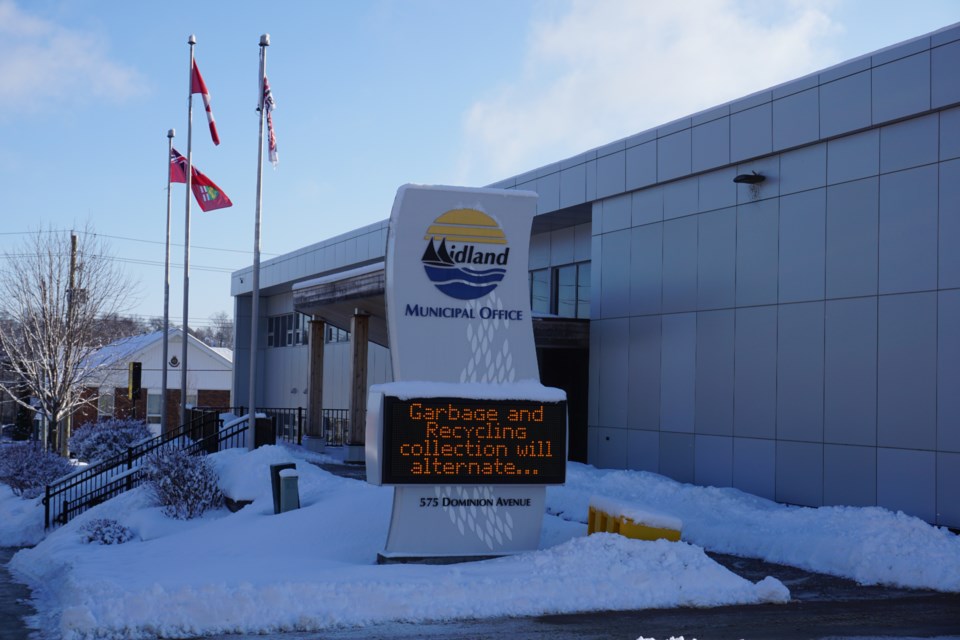If the second day of Midland council’s budget seemed short due to its four-item agenda, you may have missed the nearly nine-hour exploration into micromanagement by the new councillors on the raised dais.
Tuesday “approved in principle” motions for water and wastewater operating budgets, capital plan, and the start of exploring some tax departments.
Following that, all Wednesday required was to look at tax departments for fire and planning, then building, bylaw and parking, and also environment and infrastructure; and requests for service level changes and council and committee budgets. Wrapping up would be the start of agencies, boards and commissions with a presentation by the Economic Development Corporation of North Simcoe (EDCNS).
Coun. Jamie-Lee Ball questioned deputy fire chief Ritch Lowell about training newer fire staff in order to alleviate dependency on Barrie’s specialized services, but was informed of that city’s larger role and greater response impact. Mayor Bill Gordon stated he would “stand up for the budget where minutes matter” and support the fire services requests, committing to looking at “synergies” between the shared services of neighbouring municipalities.
Lowell did admit that the fire department hadn’t been very proactive in using the Firemark third-party insurance service to recoup on-scene costs for the municipality, and would do more with that down the road.
For the planning, building, and bylaw department, director Adam Farr explained the unknown impacts – as well as staff’s best guess – of the province’s contentious Bill 23, the More Homes Built Faster Act, 2022, on the municipality. He added that Midland’s upcoming proposed Official Plan Amendment 1 would change policy framework and set ground rules in town.
Said acting CAO and executive director of environment and infrastructure Andy Campbell: “One of the challenges in the planning and development world is that municipalities aren’t really in control; the province tells us how many houses and how many people we get.
“This is the budget for what it takes to deal with the town today; it’s a responsible budget. This is what it costs to run this business.”
In environment and infrastructure, council had a lot to say; rightfully so as Campbell pointed out at $23 million, it covered three-quarters of the town’s expenditures. Gordon again mentioned synergies with other municipalities in sharing services; Ball hammered down on user fees for recreation areas, which Campbell countered that tennis received a total of $8 in revenue in 2021.
Culture, tourism and harbour resulted in over an hour of micromanagement by Coun. Bill Meridis, Sheldon East, Catherine MacDonald, as well as Ball; one such topic included the minutia of assigning seasonal boat slips for non-residents to residents. Well past the lunch hour, Deputy Mayor Jack Contin pointed out that council’s upcoming strategic plan would address the granular details, which Gordon and Campbell reinforced.
“Right now during this budget cycle – this is a wholesale change; this is shaking a box of cats,” emphasized Gordon. “What we should be doing, unless there’s something egregious about the proposal to keep the status quo for now, is we run through this budget cycle, make any little tweaks we want – and what we’re proposing right now is not tweaking, okay?”
After lunch, a more normal discussion around North Simcoe Sports and Recreation Centre (NSSRC) user rates was held.
A freeze on user fees at 2022 rates was approved by council; and operations manager Dylan Flannery shared a staff recommendation that a three-hour minimum be added to the fee schedule to entice users back to the complex in a measure of trust and goodwill, which was also approved.
For service level changes, the micromanagement came out in full force starting with a proposed arborist position.
Staff and Coun. Jim Downer pointed out liability issues regarding risk, while Meridis gambled that nothing ill would happen over the course of one more year until the next budget rolled around for another look at the job.
Complicating matters were the unknown and impacting costs of having summer students or not, which Meridis was unable to receive a straight answer from finance staff about; as such he voted against almost all service level requests.
Downer requested recorded votes on many items: the arborist was approved; a full-time cultural staff position was approved; a customer service position was heavily defeated; a municipal law enforcement officer position was approved; Midland’s sesquicentennial (150-year) reserve placement was defeated in quick order; and an offer to bring Theodore the Tugboat to Tugfest was defeated as Gordon apologized, “sorry to pull the plug out of Theo."
What remained heading into the dinner hour was the EDCNS pitch from executive director Suzanne McCrimmon.
Despite being established in 2017, McCrimmon showcased EDCNS key performance indicators (KPI) in her anticipated presentation, all 26 of which stating what they would do in 2023 if given money; and not what had been accomplished from 2022 or prior.
Council was tired and unimpressed.
Gordon committed that instead of “pulling the pin” on the EDCNS, he and Penetanguishene Mayor Doug Rawson would sit as representatives on the group and work toward keeping it going with a report back in 2024 on their achievements.
Council heartily approved funding the EDCNS at a 50 per cent reduction ($84,000) out of reserves, contingent that no breaches of contract existed.
Day three on Thursday will wrap up the 2023 budget discussion, with Midland council hearing from many agencies, boards and commissions before reviewing amendments and remaining items.
